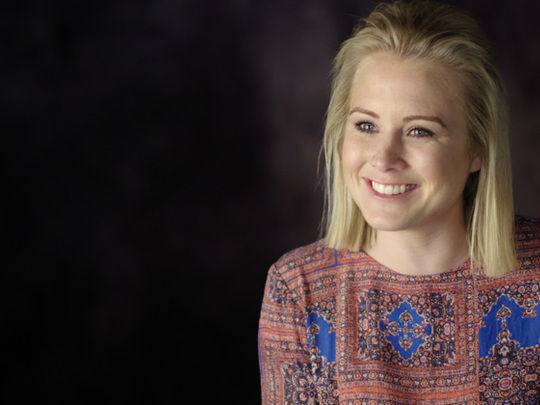
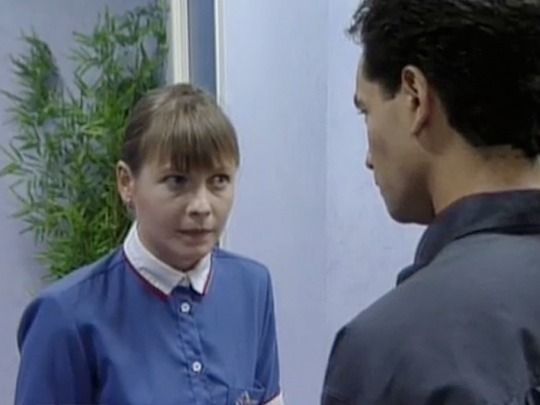
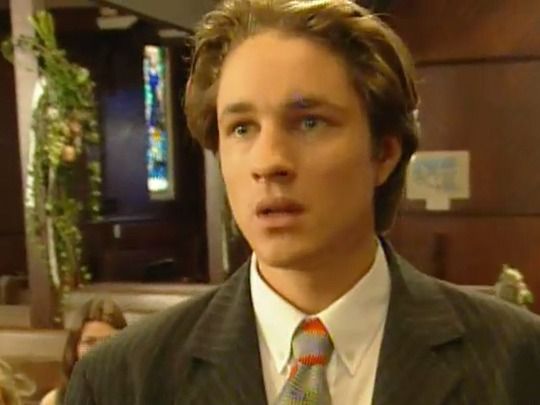
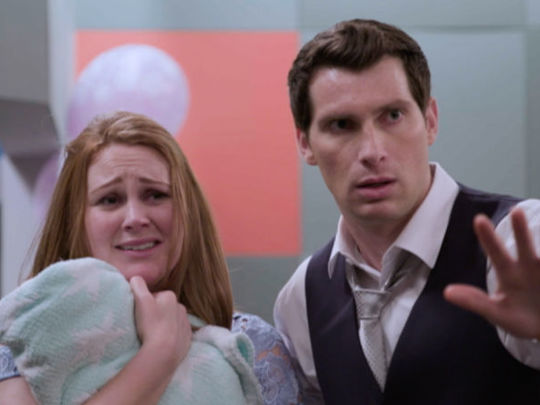
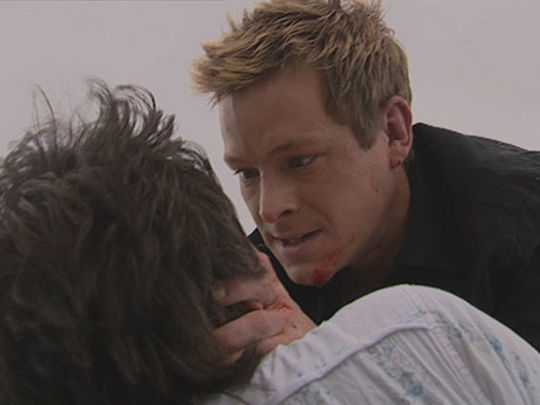
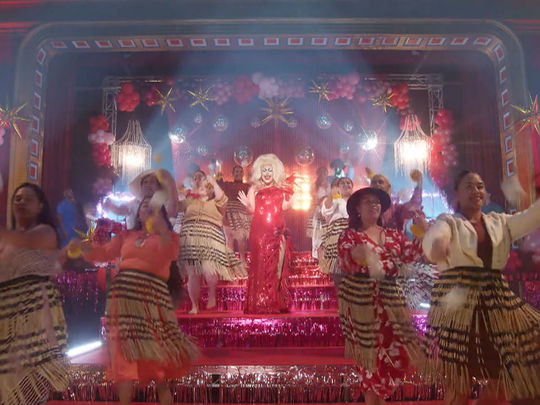
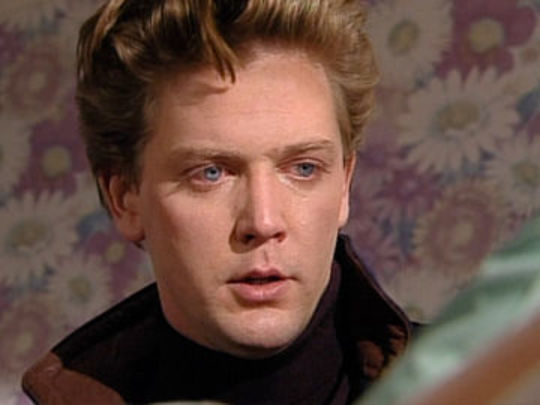
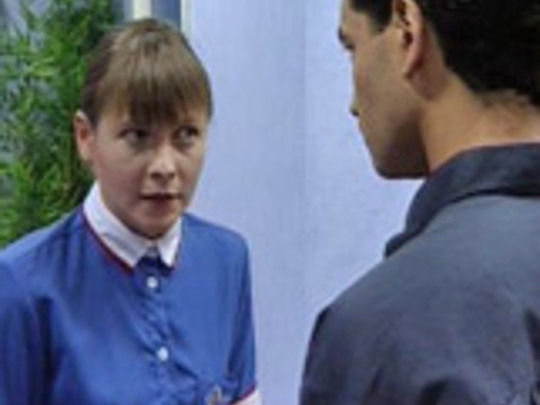

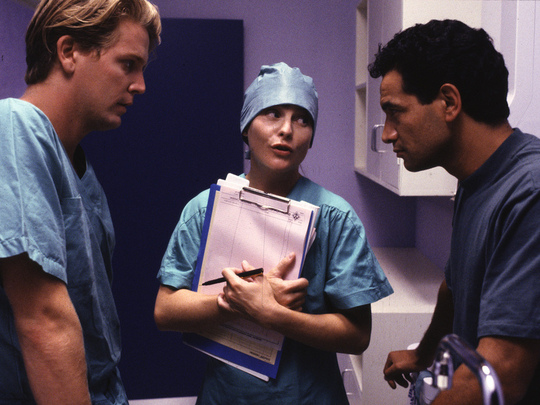
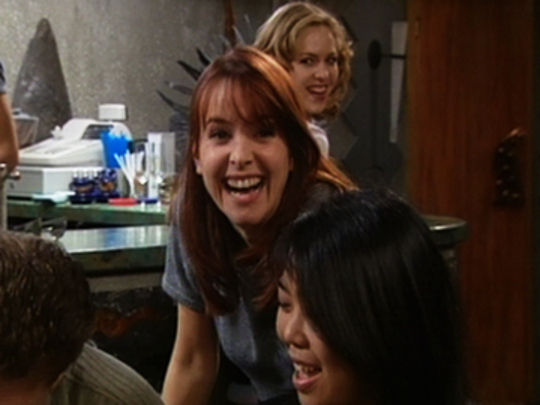
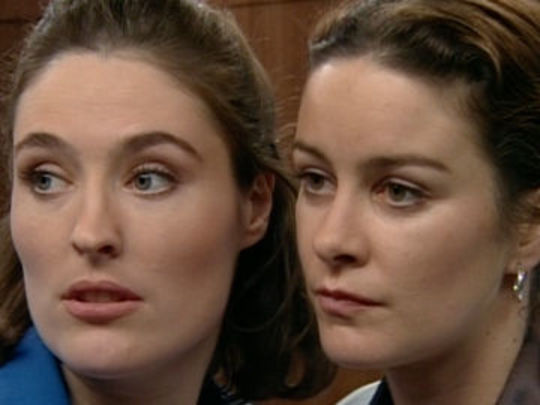
The Shortland Street Collection
The Shortland Street Collection
This collection has three backgrounds:
"How Long Will it Last?"
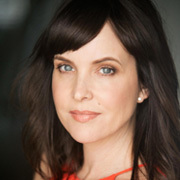
Shortland Street

Quotes about the Show
"How Long Will it Last?"
By Angela Bloomfield 08 May 2017
We used to have conversations about how long it would last. I was 19 at the time and my only knowledge of soaps was Neighbours, so I offered up a very confident "seven years…maybe 10". Now as Shortland Street hits 25 years running, it’s become so ingrained in our lives, I don’t think anyone can imagine 7pm without it. Whether you watch it, never have, or used to and don’t anymore, there's no denying that Shortland is part of New Zealand’s identity. It’s right up there with the All Blacks, and thanks to a very insightful mandate set out by NZ on Air all those years ago, it speaks to us in a language we understand – ours!
Not only did it help define our televison industry, it continues to be a vital part of TVNZ’s programming – consistently winning the ratings war at 7pm, therefore being the best lead-in show for night-time viewing, not to mention making a heap of money from advertising.
By the time I arrived on set, Shortland Street was actually quite high functioning for a production so young. The sets had stopped falling over at least. We still had one set, the café, which was constructed in a shed out the back of the studios. We would reroute the cables externally so we could adhere to our multi-camera fast turnaround formula, and even though we had to wait for the rain to stop between takes because of its noisy tin roof, we shot in it for many years. Because that’s what we did, and still do. We make good on whatever challenge presents itself, our biggest challenge being time. People have always talked about how fast the show is shot...and I will say right now, we shoot it faster today than we ever did before.
The changing face and digestion of television has meant Shortland Street storytelling has had to become more sophisticated. Characters and stories have become more intricate, as we attempt to match the TV shows around us. And sure, new technology has helped us in this evolution, one example being we now record on all three cameras simultaneously, which makes for an abundance of material and options. But at the end of the day, we are still writing five episodes a week, shooting five episodes a week and editing five episodes a week, and that will never change.
What has changed is the life of a New Zealand actor. Many Kiwi actors still have to supplement their careers with other sources of income, but for many, Shortland Street has provided the opportunity to be a working actor, often for months and even years at a time. Making a living from acting is a gift, but also a steep learning curve. I will never forget when the Inland Revenue set up office at the studios and audited a large number of the cast, a little reminder to us that we were in uncharted territory. They wanted to check we were playing by the rules; we needed the rules defined, and suffice to say, claiming GST on ciggies and milk at the petrol station was not allowed.
So let’s combine these two elements: year after year playing the same character, five days a week and under very real time constraints. We often reference the theatre when we analyse what it is to act on Shortland Street, but unlike theatre you have a camera two metres away from your nose, and truth is the only way to a successful performance. And let me tell you, I have seen some magic in my time on the show – actors reaching depths of emotion in that small amount of time, under the pressure of that schedule. It’s moving, and an honour to be a part of.
Not only have the actors bared themselves for their characters, a huge number have gone out and shared their time for the greater good. Becoming a recognisable face on this particular show makes you hot property. Whether its school fundraisers, talking to kids, or dedicating time to charities to assist in raising awareness and funds, many Shortland Street actors have given their energy generously over the years, a by-product I don’t think anyone anticipated.
So the question I get asked the most, outside of ‘what’s your favourite scene?’ (do they realise how many I’ve done?) is this one: why do people love Shortland Street so much? I think it goes back to that original mandate; the show's duty as a ‘public service’ while it was funded by NZ on Air was to ‘reflect New Zealand’s cultural diversity’ and ‘address issues of specific relevance to young people’. Even though the show has reinvented itself through the years as the TV watcher has become more discerning, it has never strayed from reflecting New Zealand's people and New Zealand perspectives, along with a good dose of Kiwi humour.
Did you know that the immortal line “You’re not in Guatemala now, Dr Ropata” was originally edited out of the script for sounding too silly? But then they chucked it back in, and the rest is history.
- Angela Bloomfield played Rachel McKenna on 1000s of episodes of Shortland Street; her character endured alcoholism, bulimia and an epic on-off relationship with Chris Warner. Bloomfield acted in film Bonjour Timothy and TV's Ride with the Devil, and has directed episodes of Go Girls, Shortland Street and Jackson's Wharf.
Shortland Street

By Mihi Murray 09 Jun 2021
Shortland Street can claim a number of firsts: the first five-day-a-week drama, the first fast turn-around NZ serial drama geared to a commercial market; it was also the first NZ soap to be exported. It has become iconic NZ television, and lines from the show have entered the culture: most famously, “you’re not in Guatemala now Dr Ropata!”
Right from the first episode Shorty (as it’s affectionately known) made an impact, with a canny sex scene ensuring the show would turn heads.
In 1991 funding body NZ On Air invited television networks to submit proposals for a daily soap opera aimed at the 14 – 25 demographic. Although TVNZ’s Shortland Street beat out TV3’s Homeward Bound, TVNZ’s top executives assessed the project as too high a risk. However programming and production executives actively encouraged the concept, with Bettina Hollings, Caterina De Nave, and Don Reynolds spearheading the push. In 1991 an agreement between NZOA, TVNZ, and South Pacific Pictures assured a year’s worth of episodes, and a three million dollar budget to work with.
Australia’s Grundy Television aided by providing extra financial assistance, writing advice, and production expertise, leveraging their proven soap opera production experience, the most relevant being The Young Doctors (1976–1983).
The production efficiently blends melodrama, social realism and comedy and turns out the required hospital soap opera elements: medical crisis, romance, human drama, comedy and cliff-hanging suspense. Despite Shortland Street’s format — populist entertainment based on imported genre models — the show has a very strong local flavour. Over the years, the storylines have had an uncanny knack of relating to and even anticipating, contemporary political, social and cultural issues.
The original setting, a private health clinic, reflected the current drive by the then-government to make health services more ‘user pays’. Later political changes in the Shortland Street administration seem to parallel restructuring within New Zealand’s health sector. Other political issues that have impacted on New Zealand society have also been dealt with in the show’s storylines, including changes in the education system, Māori land grievances, the Civil Union bill and union disputes.
Shortland Street has been a significant vehicle for changing the way ethnicity is represented on New Zealand screen. From the beginning, a diversity of cultures have been cast. Nancy Brunning (Jaki Manu), Temuera Morrison (Hone Ropata), Rene Naufahu (Sam Aleni), and Lynette Forday (Grace Kwan) were the first in a long line of Māori, Pacific and Asian talent to walk the hospital’s corridors.
In particular the portrayal of Māori and Pacific Islanders as urbane middle-class professionals (doctors, nurses, ambulance drivers, CEOs and entrepreneurs) represented a positive change for those cultures, who, apart from the odd character in Close To Home and the likes of Billy T James and Jim Moriarty, had scant presence on primetime television or stage.
The production has also been something of an unofficial industry training institution, both behind and in front of the cameras. Original Shortland producer Caterina De Nave argued that “you can always tell a Shortland Street actor, they’re technically very good .. they can cope with any changes that have to happen quickly on location or in the studio”. A sampling of names that have been through the Shorty stable reads like a who’s who of Kiwi acting talent: aside from long-timers Michael Galvin (aka 'Dr Love') and actor turned director Angela Bloomfield, the list includes Tim Balme, Geraldine Brophy, Alison Bruce, Danielle Cormack, Shane Cortese, Marton Csokas, Oliver Driver, Martin Henderson, Anna Hutchison, John Leigh, Robyn Malcolm, Miriama McDowell, Temuera Morrison, Dean O'Gorman, Craig Parker, Madeleine Sami, Miriama Smith, Antony Starr, Joel Tobeck, Calvin Tuteao, Karl Urban, Jennifer Ward-Lealand, Katie Wolfe and Tandi Wright.
Writers who scrubbed up on the show include some major names in NZ television: people like Rachel Lang, James Griffin, Gavin Strawhan and Kate McDermott. Among the directors who've gone on to varied industry careers are Mark Beesley, Murray Keane and Britta Johnstone. Former director's assistant Rachel Jean became drama and comedy commisioner at TV3, while directors Laurence Wilson and Tessa Hoffe went on to direct for major English soaps like EastEnders and Coronation Street.
Due to Shortland's primetime family time slot of 7pm, the storylines and scripts are kept in line with broadcasting standard guidelines. Early plots were fairly conservative, but over the years they have become bolder in content, daring to openly reference issues such as homosexual relationships, promiscuous sexual behaviour, AIDS, drug and alcohol abuse, teenage sex, suicide, cot death, child abuse and violence.
The long-running production has consistently reinvented itself. Shortland Street's continuing presence as the flagship Kiwi soap opera is testament to the production’s ability to adapt to ratings downturns and shifts in audience expectations.
- Mihi Murray (Ngāpuhi, Ngāti Awa) has been an actor, writer, artist, DJ and radio presenter.
Quotes about the Show
By NZ On Screen team 28 Sep 2023
"Every week we thought we were going to be fired, and I used to go home and say to my partner 'you know, I don't know how much longer I'll be working in this job'. Because the ratings were not the best in the first year."
- Writer/producer Maxine Fleming on the early days of Shortland Street, in 2017 documentary Shortland Street: Inside An Icon
"There's nowhere else you can learn skill more quickly . . . You can't faff about, some days you might be shooting 30 minutes of television. You've got so many people who went on to be highly respected in the industry, and Shortland Street is where they all started – the list is endless."
- Producer Caterina De Nave in The Sunday Star-Times, 23 May 2010
"Our most enduring soap opera has created space for important conversations about abortion, drug reform, trans rights and vaccinations, always ensuring to mix weighty and complex social issues together with soapy scandal for half an hour a day, five day a week, for 30 years."
- Website The Spinoff, 27 May 2022
"The biggest innovation we brought when we launched the show was humour . . . The key writer Gavin Strawhan, Jason Daniel [story editor and later producer] and myself made a decision that we would have a comedy story in every episode. People had never really laughed in serials before, it was seen as a big no no, and we thought that was quite crazy because Kiwis are funny. "
- Producer Caterina De Nave in The Sunday Star-Times, 23 May 2010
"[Shortland Street is] watched by audiences in the UK, Canada, South Africa and the Seychelles, Sri Lanka, Indonesia, Ireland, Iceland, Finland, Malta, the Bahamas, Fiji, Niue, the Cook Islands and the Solomon Islands."
- Tie-in book Shortland Street - Celebrating 15 Years, 1992 - 2007, page 10
"We took it out of the script for just being too silly, a load of rubbish. Jason Daniel took it out and then he went 'oh bugger it', and put it back in."
- Producer Caterina De Nave, on the "you're not in Guatemala" line heard in Shortland Street's first episode, The Sunday Star-Times, 23 May 2010
"Originally we all thought we were part of an enormous turkey, that everybody hated...because they did."
- Actor Michael Galvin, in documentary Shortland Street: Inside An Icon
"There was some pressure on me to cast blondes because blondes are regarded as light and happy and sunny, but I kept saying, 'Oh no, I have to cast people who can act'."
- Producer Caterina De Nave, in 1996 book Shortland Street - Production, Text and Audience, page 51
"Audiences at first were quite shocked and possibly a little bit confronted to hear Kiwi accents every night in a New Zealand drama."
- Producer/director Simon Bennett, in documentary Shortland Street: Inside An Icon
"I really remember very strongly . . . that's one of the things they hated about the show — those awful Kiwi voices."
- Actor Michael Galvin on early viewers disliking the Kiwi accents, in Shortland Street: Inside An Icon
"I don't think there's another show like it. I've probably worked on soaps in more countries than anyone else and on Shortland Street they do it with the smallest crew who work harder than anywhere else. It has lasted because of its quirkiness and its ability to reinvent itself – but not alienate its audience. It's got an organic life of its own."
- Director Laurence Wilson in The Sunday Star-Times, 23 May 2010
"When it's good it's laugh-aloud funny. And that's good writing. In the beginning, the actors were terrified and earnest and wooden looking, but now they are playing to the writing. It's very subtle but they're relaxed into their roles so there's a kind of ironic tone to a lot of it, an increasing sense of playfulness. The best episodes operate on more than one level."
- Listener critic Diana Wichtel, in Shortland Street - Production, Text and Audience, page 51
"The impact it had on my career was huge. It gave me the discipline of writing stories and helped so much in the mechanics of writing 30-minute episodes. There are no schools that teach you those skills. The experience was invaluable when it came to writing bro'Town."
- Oscar Kightley on joining the storyliners' team on Shortland Street, The Sunday Star-Times, 23 May 2010
"Joining Shortland Street was a real turning point in my career, it turned me into a writer."
- Rachel Lang (Outrageous Fortune, Go Girls, The Almighty Johnsons), in The Sunday Star-Times, 23 May 2010
"I always used to liken Shortland Street to the town village. it's where all the news and all the drama of the town all comes together into this one place. The reception area is like the meeting square in the middle, where there's the town crier who was obviously Marj . . . and all the drama happens there, which then feeds out into the rest of the village."
-Actor Robyn Malcolm, in Shortland Street: Inside An Icon
"Nurses always get to take breaks on the show and that doesn’t always happen in real life. Nurses also often have the energy to have a night out after they've worked a shift . . . But that's the lovely thing about television: you can make a world that's aspirational and exciting and beautiful."
- Emergency nurse turned Shortland Street medical advisor/storyliner Alison James compares television and real life, The Spinoff, 24 May 2022
"It was six months from sitting around a table to going on air — which is remarkable . . . You have to design and build sets, you're budgeting it, you're casting it, you're writing scripts, you're crewing it. Two weeks before we went on to shoot, Clayton Ercolano . . . saved our bacon. He just worked every day designing sets for two weeks — he didn't go to bed in that time."
- Producer Caterina De Nave in The Sunday Star-Times, 23 May 2010
“You feel a bit invaded when kids find out where you live and come banging on your door at seven o’clock on a Saturday morning. But usually people don’t hassle me because they think I’m Carmen, and she has a lot of respect because she won’t be pushed around . . . I’m playing her the whole time, because when I’m out people see me as Carmen. It’s Carmen that’s famous, not Theresa.”
- Theresa Healey, who played nurse Carmen Robert for five years, in Shortland Street - Production, Text and Audience, page 113
"Producer Caterina De Nave, who was responsible for getting the soap up and running, reveals that from the outset it was the ultimate training ground for the crew as well as the actors. It nurtured the talents of the likes of Whale Rider writer and director Niki Caro, Outrageous Fortune creator Rachel Lang, Eastenders' director Laurence Wilson, Coronation Street script editor Nick Malmholt..."
- Sunday Star-Times writer Cath Bennett, 23 May 2010
"They had about four or five people trying to write themes. I did a demo and they chose mine. I hadn't seen anything to do with the show . . . I did something based on a relationship struggle and what I could do within a minute of screen time."
- Graham Bollard on composing the show's opening theme song, in Shortland Street - Production, Text and Audience, page 51
"The Shortland Street theme song is perhaps our most enduring piece of television music, right up in the god tier with the Country Calendar song and the Interislander jingle."
-TV reviewer Alex Casey on the Shortland Street theme song, The Spinoff, 28 May 2022
"It’s nice to have an age range on the show and I stick up for my age group when I’m talking to the writers, because there’s a vast audience of older people out there who are interested in what happens to a woman of this age. I get a lot of letters from young girls telling me they like Jenny and asking how I cope with Nick. When Jenny got pregnant they asked what was going to happen about the baby."
- Actor Maggie Harper, who spent six years playing PA Jenny Harrison, in Shortland Street - Production, Text and Audience, page 107
"Eventually after I’ve done the role for long enough, and this is the same with every actor on the show, they start to hear my voice when they write the character. They’re no longer writing for this nebulous idea of Chris Warner, they’re writing for the way I play him."
- Michael Galvin, in book Shortland Street - Production, Text and Audience, page 103
"As it goes on I get more into the character and I know more about him, and the writers get to know him as well. You notice when you have a new writer and you’re given words the character would never say. I just ask the director to change them."
-Karl Burnett, who played Nick Harrison for 14 years, in Shortland Street - Production, Text and Audience, page 105
"As soon as you juxtapose comedy with something that's hard-edged or tragic, you get something very potent. Comedy gives you a lot of pace and a lot of support for your stories."
- Producer Tony Holden on how the show combines comedy and drama, in Shortland Street - Production, Text and Audience, page 51
"With every story on Shortland Street there's an underlying assumption that everything will be okay eventually. There's always a sense of hope, a sense of tomorrow. When you're doing an intense story about incest or about a woman whose husband has just killed someone in a drunk driving accident, what better thing than to cut away to someone telling a joke? Shortland Street says, 'Here's your doom, but over here is laughter'."
- Producer Caterina De Nave, in Shortland Street - Production, Text and Audience, page 51
"I think soap is something you’d call this show from the outside. When you’re in it you certainly can’t afford to act in it as if it were a soap. I see it as another acting job, and in any acting job you try to make it as truthful and interesting as possible."
- Michael Galvin, in book Shortland Street - Production, Text and Audience, page 105
"Shortland Street also laughs at itself with a kind of good-natured cynicism. Sometimes it places its characters in ridiculous situations (e.g. the Enid Blyton-style treasure hunt), sometimes it mocks the soap genre."
- Authors Barbara Cairns and Helen Martin, in their book Shortland Street - Production, Text and Audience, page 51
"In past episodes, a nasty traffic accident has taken care of smaller mass write-outs, but that's a bit overdone now. a mass murder or bombing would be rather distasteful, and most of the other snap disappearance devices have also already been used: freak waves, brain aneurysms, accidental blows to head, election to Parliament, fabulous overseas job offers, even lightning strikes. The pile of unused disappearing tricks is pretty motley: white slave traders, Ebola outbreaks and spider bite are all I can think of."
- Writer Jane Clifton speculates on how the show will manage to get rid of 14 characters, The Dominion, 2 December 2000, page 25
"People say 'What are you moaning about? Everyone notices you.' But the alienation aspect is annoying. People don’t always talk to you, but they study you and talk about you while you’re two feet away, like you’re on television and can’t hear them. They say 'Is it him? Is it him? I think it’s him.' "
- John Leigh, who played nice guy Lionel Skeggins for five years, in Shortland Street - Production, Text and Audience, page 112
"When I began I didn't really know what I was doing. I felt quite out of my depth. Weirdly, though, I knew I was in the right place. I knew I was doing the right thing — I just didn't know how."
- Amanda Billing, who played fan favourite Doctor Sarah Potts for a decade, in a 2016 ScreenTalk interview